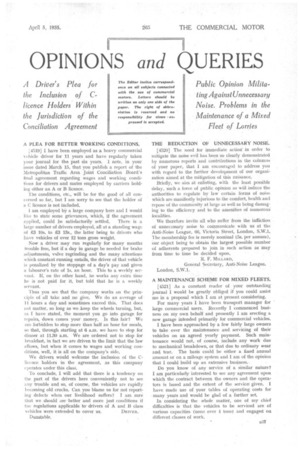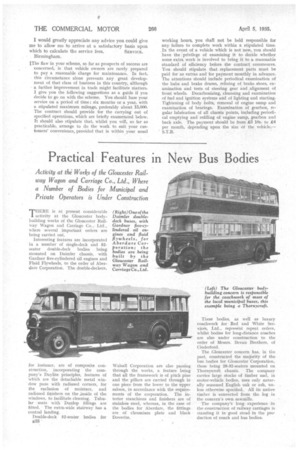OPINIONS and QUERIES
Page 55

Page 56

If you've noticed an error in this article please click here to report it so we can fix it.
A PLEA FOR BETTER WORKING CONDITIONS.
[4519] I have been employed as a heavy commercial vehicle driver for U years and have regularly taken your journal for the past six years. I note, in your issue dated March 15, that you publish a report of the Metropolitan Traffic Area Joint Conciliation Board's final agreement regarding wages and working conditions for drivers and mates employed by carriers holding either an A or B licence.
The conditions, etc., will be for the good of all concerned so far, but I am sorry to see that the holder of a C licence is not included.
1 am employed by a large company here and I would like to state some grievances, which, if the agreement applied, could be satisfactorily settled. There is a large number of drivers employed, all at a standing wage of 2,3 10s. to £3 13s., the latter being to drivers who have vehicles of over 12 tons gross weight.
Now a driver may run regularly for many months trouble free, but if a day in garage be needed for brake adjustments, valve regrinding and the many attentions which constant running entails, the driver of that vehicle is penalized by the stoppage of a day's pay and given a labourer's rate of 1s. an hour. This to a weekly servant. If, on the other hand, he works any extra time he is not paid for it, but told that he is a weekly servant.
Thus you see that the company works on the principle of all take and no give. We do an average of 11 hours a day and sometimes exceed this. That does not matter, so long as we keep the wheels turning, but, a.s I have stated, the moment you go into garage for repairs, down comes your money. Is this fair? We are forbidden to stop more than half an hour for meals, so that, through starting at 6 a.m. we have to stop for dinner at 11.30 a.m. We are ordered not to stop for breakfast, in fact we are driven to the limit that the law allows, but when it comes to wages and working conditions, well, it is all on the company's side.
We driver a would welcome the inclusion of the Clicence holders in the agreement, as this company eperates under this class.
To conclude, I will add that there is a tendency on the part of the drivers here conveniently not to see any trouble and so, of course, the vehicles are rapidly becoming old crocks. Can you blame us for not reporting defects when our livelihood suffers? I am sure that we should see better and more just conditions it toe regulations applicable todrivers of A and B .class
vehicles were extended to cover us. DRIVER. Dunstable. THE REDUCTION OF UNNECESSARY NOISE.
[4520] The need for immediate action in order to mitigate the noise evil has been soclearly demonstrated by numerous reports and contributions in the columns of your paper, that I am encouraged to address you with regard to the further development of our organization aimed at the mitigation of this nuisance.
Briefly, we aim at enlisting, with the least possible delay, such a force of public opinion as will induce the authorities to regulate by law certain forms of noise which are manifestly injurious to the comfort, health and repose of the community at large as well as being damaging to the efficiency and to the amenities of numereiti• localities.
We therefore invite all who suffer from the infliction of unnecessary noise to communicate with us at the Anti-Noise League, 66, Victoria Street, London, S.W.1. The membership fee is merely nominal (5s. per annum), our object being to obtain the largest possible number of adherents prepared to join in such action as may from time to time be decided upon.
R. F. MILLARD, General SeCretary, Anti-Noise League. London, S.'W.i.
A MAINTENANCE SCHEME FOR MIXED FLEETS.
[4521j As a constant reader of your outstanding journal I would be greatly obliged if you could assist me in a proposal which I am at present considering.
For many years I have been transport manager for large commercial users. Recently I commenced business on My own behalf and presently I am erecting a new garage intended primarily for commercial vehicles.
I have been approached by a few fairly large owners to take over the maintenance and servicing of their vehicles on an agreed yearly payment. Such maintenance would not, of course, include any work due to mechanical breakdown, or that due to ordinary wear and. tear. The basis could be either a fuzed annual amount or on a mileage system and I am of the opinion that I could build up an extensive business.
Do you know of any service of a similar nature? I am particularly interested to see any agreement upon which the contract between the owners and the operators is based and the extent of the service; given. I have made use of your tables of operating costs for many years and would be glad of a further set.
In considering the whole matter, one of my chief difficulties is that the vehicles to be serviced are of various capacities (none over 4 tons) and engaged on different classes of work.
I would 'greatly appreciate any advice you could give me to allow me to arrive at a satisfactory basis upon which to calculate the service fees. SERVICE. Birmingham.
[The flaw in your scheme, so far as prospects of success are concerned, is that vehicle owners are rarely prepared to pay a reasonable charge for maintenance. In fact, this circumstance alone prevents any great development of that class of business in this country, although a further improvement in trade might facilitate matters. I give you the following suggestions as a guide if you decide to go on with the scheme. You should base your service on a period of time: six months or a year, with a stipulated maximum mileage, preferably about 15,000. The contract should provide for the carrying out of specified operations, which are briefly enumerated below. It should also stipulate that, whilst you will, so far as practicable, arrange to do the work to suit your customers' convenience, provided that is within your usual
working hours, you shall not be held responsible for any failure to complete work within a stipulated time. In the event of a vehicle which is not new, you should have the privilege of examining it to decide whether some extra work is involved to bring it to a reasonable standard of efficiency before the contract commences. You should stipulate that replacement parts must be paid for as extras and for payment monthly in advance. The attentions should include periodical examination of the hubs and brake drums, .relining of brake shoes, examination and tests of steering gear and .alignment of front wheels. Decarbonizing, cleansing and examination of fuel and ignition systems and of lighting and starting. Tightening of body bolts, removal of engine sump and examination of bearings. Examination of gearbox, regular lubrication of all chassis points, including periodical emptying and refilling of engine sump, gearbox and back axle. The payment should be from £3 10s. to £4 per month, depending upon the size of the vehicle.S.T.R.




































































































